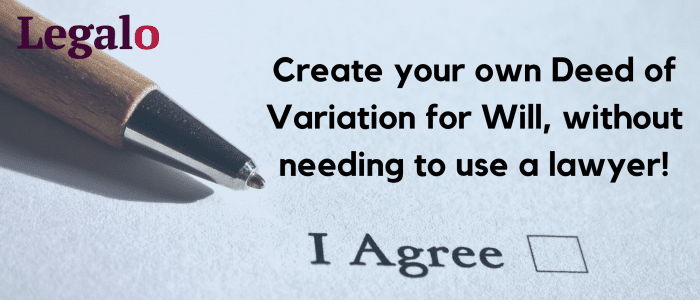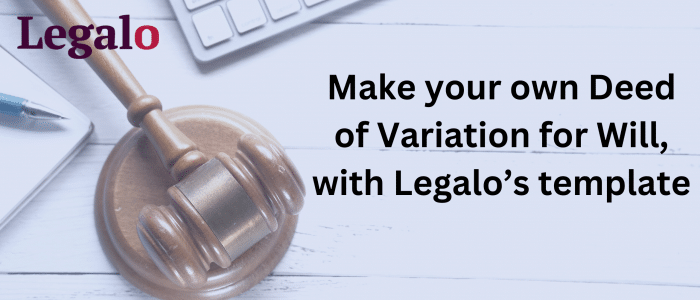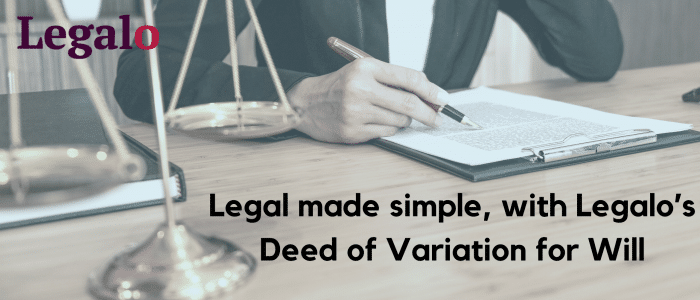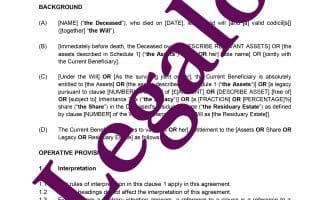Deed of Variation for Will
Our Deed of Variation for Will template:
- Now over 1,300 sold!
- Easily vary the Will with this Deed
- UK-solicitor-drafted template Deed
- Full guidance notes in clear English

How Does It Work?
-
1. Download
-
2. Edit
-
3. Print
-
4. Sign
This is our Deed of Variation for Will template. Use it when a person dies who has left a Will and the beneficiaries want to change who inherits. This is a way to change a will after death. You would generally use a Deed of Variation after obtaining the Grant of Probate. This would mean the Executors have the proper authority to manage the assets. This is when they have obtained the Grant of Probate from the local Probate Office. However, this isn’t necessary if the estate is so small that you don’t need a Grant of Probate.
This is our best-selling template, with over 1,300 sold!
Use this deed of variation when the current beneficiary lives in the UK. What is relevant is where the beneficiary lives; not where the person who has died used to live.
There is a strict 2-year deadline from the date of death for signing a deed of variation.
Using our template, you can validly and easily vary the Will.
Customise our deed template to the specific individual requirements of your situation. It comes complete with a detailed guide that leads you through each clause in the deed.
We are told, and we don’t disagree, that ours is the best such template on the market, and much easier to use, due to its helpful written guide, which our competitors do not offer.
Why use Legalo’s Deed of Variation?
This type of do-it-yourself Deed of Variation puts in place a reliable deed. It is suitable for varying a deceased’s estate. David, our co-founder and solicitor of over twenty years, has drafted it. This ensures that you can rely on the Deed template being both legally comprehensive and up-to-date.
Our detailed drafting guidance notes (free with the template) set out a clause-by-clause explanation of the deed. This makes completing the final Deed of Variation simple.
This is a very cost-effective way to go about completing the variation of who receives what from a deceased’s estate. A copy of the guidance notes are available here: guide to this deed of variation for will template.
This sort of a deed is sometimes also known as a Deed of Family Arrangement.
Using our Deed of Variation for Will template
Buy this template for a Deed of Variation for Will and then download it in Word format. Just click the “Download” button once purchased. Then easily edit it to suit your own needs.
We provide a full money-back guarantee if you are not happy with your template document for any reason.
Once purchased, you can reuse the template as many times as you want. So you can create further deeds of variation at no further cost. We keep our templates under review to ensure they are up-to-date. When we update a template that you have bought, we will notify you by email. You will then get a free up-to-date template.
This Deed of Variation is suitable for use in Scotland, as well as the rest of the UK.

Inheritance and Variation – when to use the Deed
Someone, who is due to receive an inheritance as a result of the death of a person who left a valid will, can use our Deed of Variation for Will template to divert all or some of that inheritance to someone else. Used in this way, the Deed of Variation can help that person reduce future Inheritance Tax liability if they were to pass away in the next 7 years.
NB It does not generally affect or reduce the Inheritance Tax on the estate of the person who has just died. An exception to this is where a person diverts their inheritance to a charity. That would reduce the inheritance tax on the deceased’s estate.
It has several options, so for example the deed of variation is suitable for use:
1. to divert part or all of the person’s inheritance;
2. where there was an asset that was owned jointly with the deceased under a “joint tenancy” (e.g. a house) which, as a result of the death, has now become owned solely by the survivor (NB it also works for any joint property held under a “tenancy in common” too);
3. to divert the inheritance to (a) someone else who is a beneficiary under the will or (b) someone who would not otherwise be a beneficiary under the will;
4. where there is one or more than one person passing the legacy on; or
5. where there is one or more than one person you are passing the legacy on to.
Our template complies with the HM Revenue & Customs requirements for the contents of a deed of variation, but you may find their checklist helpful to look at yourself. You can find it here: https://www.gov.uk/government/publications/inheritance-tax-instrument-of-variation-checklist-iov2.
Can I use a Deed of Variation to put money into a trust?
You can use our deed of variation template to divert money from the original beneficiary to a trust. However, please note:
- our template does not create the trust (if you don’t already have a trust set up), so you will need a trust deed; and
- as most trust work is complex and there are also tax rules to comply with, we do not offer a template to create a complex trust deed. You will need to use a solicitor to provide you with specific legal advice for this work; but
- if you only want to set up a simple “bare trust” (and are not bothered about making tax savings), then you can use our template for a bare trust deed.
If you want a trust deed that achieves tax savings, then contact us if you would like a no-obligation, fixed-fee quote from a recommended firm of solicitors for providing legal advice and creating the trust deed for you.
What About an Intestate Estate?
This version is not suitable for use in the event of the estate of someone who has died “intestate”. Intestate means without leaving a valid will, in which case the Intestacy Rules apply. Instead, you need a different form of deed of variation for this. However, one is available from Legalo: deed of variation for intestacy template.
What if I am not a UK resident and am not looking to save on Inheritance Tax?
If you are not UK tax resident (and are not planning on being again before you pass away) and have little in the way of assets in the UK, then you might not get a benefit from the Deed of Variation (as you are unlikely to be liable to UK inheritance tax on your estate). A simpler and slightly cheaper solution in this case is to use a Deed of Gift.

FAQs on Deeds of Variation
Below, we answer many of the most popular questions on the Internet about deeds of variation; how and when they can be used, etc.
Can a will be varied after death?
Yes. You need a deed of variation for this.
What is a deed of variation to a will?
A deed of variation to a will is a method, that HMRC approves of, for diverting an inheritance that you do not need to a different person, e.g. your children or grandchildren. It means that HMRC do not treat you as having received the gift or becoming liable for extra inheritance tax (if any) on your estate should you pass away within 7 years of making the gift.
Do I need a deed of variation to a will? When should I use a deed of variation to a will?
You only need a deed of variation if:
-
you are due to receive a gift from someone who has died;
-
you want to divert that gift to someone else, and
-
you want to avoid the risk of an inheritance tax bill on your own estate becoming larger than it need be if you were to die within 7 years.
This is the issue the deed of variation solves: allowing you to pass on the gift you are due to receive without it counting towards your estate if you were to die within 7 years of passing it on. So it can save potential future inheritance tax on your estate.
When does a deed of variation to a will need to be made?
If you want to make a deed of variation, you need to sign it within 2 years of the date of death of the person leaving you the inheritance. If you try to make it later, it is invalid. This is a strict time limit.
What gifts can be varied with a deed of variation to a will?
Any gift made under a will can be varied in this way. Also, you can vary the automatic inheritance of property that was in joint names and held on a “joint tenancy” basis.
How to write a deed of variation to a will
The easiest way to write a deed of variation to a will is to use Legalo’s template. We make it easy for you to do the variation work yourself, we reduce the amount of legal jargon, and each template comes with a full written guide. With the help of our template, you can produce a legally-binding and HMRC-compliant deed of variation quickly. It also reduces the variation cost to a minimum.
What is included in a deed of variation to a will?
For a list of the contents of our deed of variation for a will, please see our separate Guide page that has the full details.
Can you make a deed of variation to a will yourself?
Yes – with Legalo’s great template, this is an easy task. You do not need a lawyer involved in the process at all. So you can make significant cost savings this way.
How long does a deed of variation to a will take to make?
We estimate that this will take you about 20 minutes with our template and its helpful guide. If you get stuck at any stage, just call our helpline and we will be happy to help.
Are changes under a deed of variation subject to inheritance tax?
This question could cover 2 situations:
1. Referring to the estate of the person who has died, technically, yes. However, virtually no variation actually changes the liability of the estate to tax. These are the 2 examples we can think of:
-
the tax goes down if you pass your gift on to a charity; or
-
the tax goes up if a charity declines its gift and passes it on to a non-charity (however, this never happens in practice).
2. In the case of the potential future estate of the beneficiary who has given away the gift, no. The deed of variation means HMRC treat them as not receiving the gift, so the gift has no inheritance tax effect on their estate.
What are the pros and cons of a deed of variation to a will? Are there any disadvantages of a deed of variation to a will?
There are virtually no downsides to using a deed of variation – there’s just a small cost and a bit of your time needed.
The upside is that you make a valid deed of variation when this is what you need. The result is that the person passing the gift on is treated as never having received the gift for the purposes of working out their estate’s inheritance tax liability if they should die within 7 years of the date of the variation. This helps with your tax planning.
Can a deed of variation to a will be challenged?
Generally, no. This is simply the assignment of a gift, that was due to one person, onto a different person by the original recipient. The deed could only be challenged in 2 situations:
-
if you are bankrupt (i.e. actually made bankrupt or technically insolvent because either you owe more than you own or cannot afford to pay your debts when they fall due, but you’ve not yet been judged bankrupt); or
-
if someone challenges the deceased’s whole will made by claiming that (a) they were a dependent of the deceased and (b) the deceased has not made proper provision for them.
The next point is not strictly a challenge situation, but one where you could get in serious trouble for using a deed of variation. If you are trying to avoid losing Benefits to which you were previously entitled before the inheritance, then don’t do this. Don’t use a deed of variation for this purpose. If you off-load inheritance (e.g. to your children) so that you can continue to receive Benefits, this is “benefits fraud”, which is a criminal offence. The penalties for such fraud are heavy fines and up to 10 years in jail, as well as a criminal record.
Do all beneficiaries have to agree to a deed of variation of a will?
You only need the agreement of the beneficiaries the variation affects. So for example if 2 beneficiaries inherit a house in equal shares, and 1 of them wants to leave his or her half to their children, then only that beneficiary must approve the variation. There is no effect from the variation on the new owner of the other half, in the sense that they still have their half.
Who signs a deed of variation to a will?
All of the beneficiaries affected by the variation need to sign it. The executors only need to sign it if the variation increases the inheritance tax liability of the estate (this is highly unlikely to be the case). We suggest that the new recipient of the gift also signs to indicate they accept it, but this is not a legal requirement.
Does a deed of variation to a will need to be registered?
Sometimes it does: only if you want to roll over a capital gains tax liability that has already accrued on an investment (e.g. shares or an investment property) so that no one needs to pay the tax liability now. You would then register that situation with HMRC. Our guide mentions when you need to do this and how you can do so.



